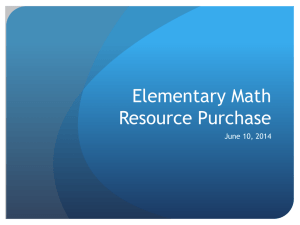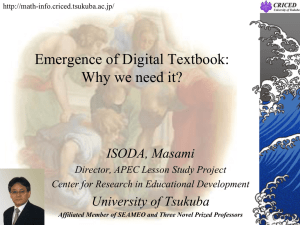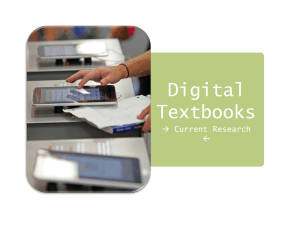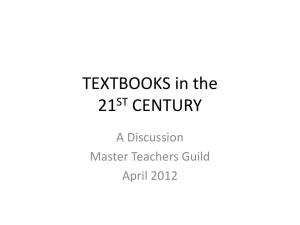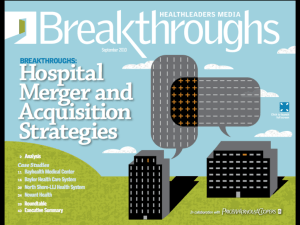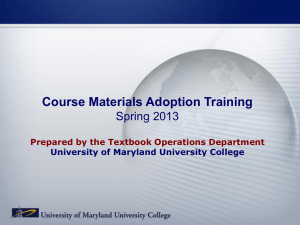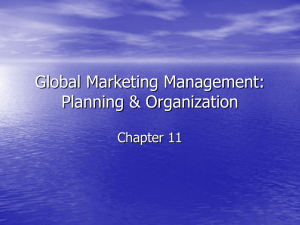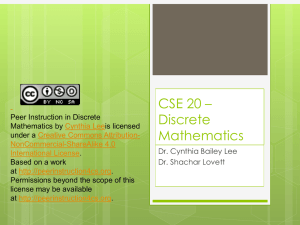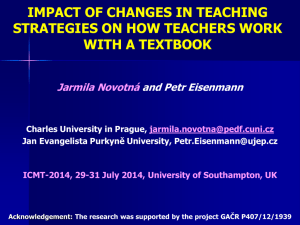PPT
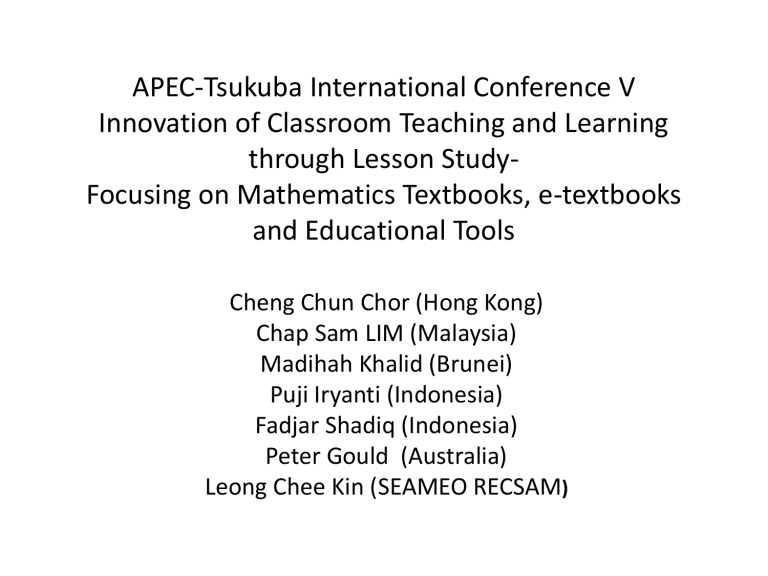
APEC-Tsukuba International Conference V
Innovation of Classroom Teaching and Learning through Lesson Study-
Focusing on Mathematics Textbooks, e-textbooks and Educational Tools
Cheng Chun Chor (Hong Kong)
Chap Sam LIM (Malaysia)
Madihah Khalid (Brunei)
Puji Iryanti (Indonesia)
Fadjar Shadiq (Indonesia)
Peter Gould (Australia)
Leong Chee Kin (SEAMEO RECSAM )
Part A Information from every economies
Background, Education in Hong Kong
• A more completed syllabus was introduced in 1983 syllabus.
• At that time, some schools teach the material half year earlier.
• The present syllabus is used since 2000.
Part A Information from every economies
• Malaysia
• In Malaysia, teachings have been based on textbook from 70% to nearly 90%.
• After the introduction of Teaching Math and Science using English (PPSMI).
• The books used are written strictly according to the government curriculum.
• Language is an issue in Malaysia as there are different languages used.
Part A Information from every economies
• Malaysia
• Books are provided by government and loan to schools and then loan to students later on. And the medium of teaching of instruction is English or Mother Tongue.
Though there are some special treatment in school like the Chinese schools.
Part A Information from every economies
• Brunei
• English is the medium of instruction in all nonlanguage subjects. And the assessment items for O and
A level are designed by the Cambridge Examination
Board.
Part A Information from every economies
• Brunei
• Introduced SPN 21 New Education System in 2009.
Teaching and learning are required to use the following
6 representation as far as possible
• Concrete
• Real life
• Verbal
• Diagram
• Symbolic
• ICT
Part A Information from every economies
• Thailand
• Usually all schools used the government textbook.
• Thai language is only medium of instruction in all schools.
• Started to use translated mathematics textbook from
Japan.
• Teachers and students loved the picture approach.
Part A Information from every economies
• Thailand
• Introduction of mathematics concepts in the Japanese textbook are good.
• Sequence of the topics in the translated textbooks is not the same as the government curriculum.
• Using of translated textbook is a result of Lesson
Study, which focus on the open approach in teaching mathematics.
Part A Information from every economies
• Thailand
• 22 schools on Lesson Study.
• Conducted lesson study every week
• Two-day a week, one day for planning one day for reflection.
• Central examination for the third and sixth grade,
• Schools with lesson study and Japanese textbooks are doing better than before.
Part A Information from every economies
• Indonesia
• There are 70 dialects
• Using textbook in one language is difficult
• Recommendation of books from the national book centre
• Schools are required using textbooks.
• Government brought the rights and sold the books
(also as e-books)
• Everyone can print the books from the e-books.
Part A Information from every economies
• Indonesia
• The mathematics content is from the government
(from 2006)
• Normally no work book.
• Teachers use more work-sheets
• The questions used in the textbooks are mostly drilling and practice
• Questions are related to daily life
Part A Information from every economies
• Australia
• Textbook is not a requirement, but they need to teach in comply with the government curriculum.
Part A Information from every economies
• Hong Kong
• Books used endorsed by the Education Bureau.
• New Primary Curriculum designed In 2000,
• There are 6 set of primary mathematics textbooks.
Since 2004, a centralized assessment is conducted in
Primary 3, Primary 6, and secondary 3. These assessments affected the progress of teaching.
Part A Information from every economies
• Hong Kong
• More teaching time is allocated to measurement and statistics in Curriculum 2000
• No content of ratio .
• No index representations of integers
• No area of circle
• No Positive and negative numbers.
Part A Information from every economies
• Hong Kong
• Primary school mathematics textbooks are work book related.
• Big market for the primary mathematics textbooks
• Textbooks are very well written and are very thick.
• One of the techniques of teaching used by textbook is filling in the blank of the procedure.
Part A Information from every economies
• Hong Kong
• The textbooks are very well written and are very thick.
• One of the techniques of teaching used by textbook is filling in the blank of the procedure.
Part B How can we use better our textbook?
How do you use your textbook in your country?
• Sharing the methods of textbooks and knowing theories on curriculum and textbooks.
• How can we use our textbook meaningfully?
• Elaborating the model approaches using
• textbooks to develop mathematical thinking and communication
• Example, there are three pieces of land, each is
4square meter, and each square meter need 3 liter of water. How much water is needed?
• Example
• There are 45 orange balls and 75 white balls.
• Find the fraction of orange ball in respect to the total number of balls.
• Find the fraction of white ball in respect to the total number of balls.
Part B How can we use better our textbook?
Part B How can we use better our textbook?
Part B How can we use better our textbook?
• Teachers need to
• Base on their theory of work.
• Provide framework of teaching in concepts,
• Provide items for exploration.
• Teachings of basic concepts are based on the textbooks, and teachers usually have to develop their work sheets.
Part B How can we use better our textbook?
• Adapt the textbooks according to the context.
Formula of area a triangle
• Stage 1, find the area and develop formula for a right angle triangle.
• Stage 2, find the area of a acute angle triangle, using the formula of area of right angle triangle to develop the formula.
• Stage 3, the formula for an obtuse angle triangle, as the height is outside the triangle.
• Combine the three
Part B How can we use better our textbook?
• Provide more approaches in learning of concepts.
• Example: Teaching of HCF
• Three approaches
• Using listing,
• Prime factorization
• and short division.
Part B How can we use better our textbook?
• Arrange the content sequence according to the strength and interest of students
• Pay attention on topics that can bring in discussion and interaction among studnets.
• Use a thinking approach in teaching and learning of mathematics concepts
• Design tasks for investigations after the learning of concepts
